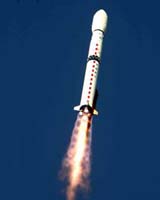

(Space Daily) China's seed-breeding satellite, Shijian-8, successfully landed in Sichuan Province, southwest China, at 10:43 a.m. Beijing time on Sunday after a 15-day flight in space. The recoverable satellite was launched from the Jiuquan Satellite Launch Center in the northwest China desert on Sept. 9. [...]
Scientists from the Space-breeding Center of the Chinese Academy of Agricultural Science used the mission to carry out experiments aimed at discovering what happens to the germination and sprouting of plants when they are exposed to zero gravity.
After being exposed to cosmic radiation and zero gravity, some seeds may mutate and produce higher yields and improved quality when planted back on earth, scientists said.
It is interesting that the Chinese are exploring "space agriculture" and using the gained knowledge to benefit their farms on planet Earth. Although China's interest may sound silly to some, this technique of altering grain in space may become critical for future colonies of Mars and Jupiter since they lack the nutrient rich top soil common on Earth.
Of the three main space powers sending human beings into space, China seems to be the most aggressive at using space to benefit its people directly. Although NASA has the skills to get us to the stars, China has the will to get us there, and the future alliance between the two may benefit the human race for years to come.
Want more space geek news? Then subscribe below via email, RSS or twitter for free updates! Prefer another service? How about via RSS or follow Colony Worlds on Twitter!




![ColonyWorlds[at]Gmail[dot]com](http://img.photobucket.com/albums/v438/hiddennook/ColonyWorlds.png)







No comments:
Post a Comment
You can either visit the stars or watch them from afar.
But if you choose the former, you'll definitely get a better view.
~Darnell Clayton, 2007
Note: You do not need a Blogger account in order to comment, but you do need to solve the universal puzzle below.